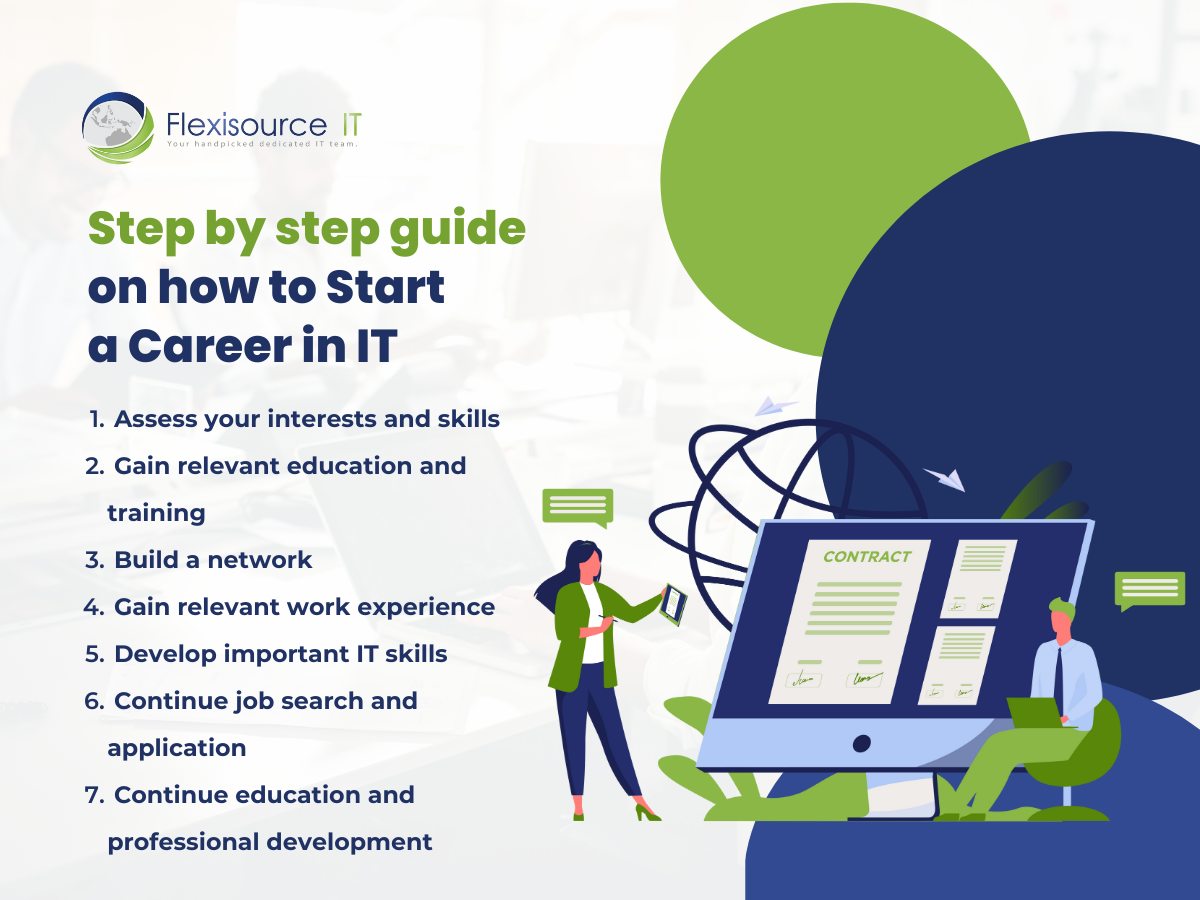Starting a new career in tech can sometimes be daunting. Information Technology (IT) is one of the utmost complex fields worldwide. Trends in tech are constantly evolving, and there is a constant demand for technology and innovation. Still, this industry provides a diverse range of opportunities for professionals.
So, if you want to start a career in IT field but are unsure where to begin, this article is for you. We will tackle valuable tips from Flexisource IT experts and how you can get started on a path to success.
What is the job outlook in the IT industry?
Before starting your journey, it is essential to ask yourself – is a career in IT worth it? Well, here’s your answer. The future of the IT industry is not slowing down. So are the market and employment. The job outlook in the IT industry is generally positive and shows no signs of slowing down. With the increasing demand for technology in various sectors, there is a growing need for skilled professionals to develop, maintain, and manage these technologies. Moreover, the COVID-19 pandemic has also accelerated the shift toward digitalization, further fueling the demand for IT professionals.
According to the US Bureau of Labor Statistics (BLS), employment in computer and information technology occupations is anticipated to grow 15% from 2021 to 2031. Likewise, in Australia, the job outlook for this industry remains positive, with increasing demand. According to the Australian Government Department of Education, Skills, and Employment, employment in the IT industry is projected to grow by 11.5% from 2020 to 2025, adding an estimated 37,400 new jobs.
This growth is attributed to the increasing need for cybersecurity, cloud computing, and extensive data management. Furthermore, many IT jobs offer above-average salaries and opportunities for career advancement. According to data from SEEK, the average salary for an IT professional in Australia is over AUD 100,000 per year, with wages varying depending on the specific role and level of experience.
Overall, the job outlook in the IT industry is positive, and it is an excellent time for individuals to pursue a career in this field. With the right skills, education, and experience, aspiring IT professionals can take advantage of the many job opportunities available and build a successful career in this exciting and rapidly evolving industry.
A step-by-step guide to starting a career in IT
Starting a career in IT is no walk in the park. It might take you months, even years, to prepare for it. However, it is not impossible. Here is a step-by-step guide that may help you start your career in IT.

Assess your interests and skills
First and foremost, you need to assess your skills and interests. Knowing if you are interested and skilled enough to pull through the whole journey is essential when choosing a career. After all, this is the job that you might be working for years. In addition, it is crucial to take the time to assess your skills and strengths to make an informed decision about which IT career path is best for you.
So before building your IT career, ask yourself, “Is a career in IT right for me?” To answer this question, start by identifying your interest in IT. Do you enjoy programming, data analysis, etc.? Make a list of areas in tech you are most interested in and determine what kind of IT-related tasks you enjoy doing and which ones you are good at. Try doing the following:
- Take an inventory of the tasks that make up your day-to-day job
- Look for patterns in the types of activities that interest you
- Ask yourself what kind of technology excites you
- Research different fields within the tech industry
- Talk to people in the field who can provide insight into their experiences.
Gain relevant education and training
Next, education. As mentioned earlier, a career in IT is competitive. A formal education, training, and certification can help you stay ahead of the competition. The educational requirements for a career in IT can vary depending on the specific field or job position. However, a minimum of a bachelor’s degree in a relevant field such as information technology, computer science, computer engineering, or a related field is generally required. Some positions may also need a master’s or other advanced degrees, particularly for higher-level management or research positions.
In addition to formal education, IT professionals often pursue certifications in specific technologies or software to demonstrate their expertise and stay current with the latest advancements in the field. These certifications can be obtained through various industry organizations, often requiring passing an exam or completing a specific training program.
It’s also worth noting that while formal education and certifications are essential, practical experience and demonstrated skills in programming and other IT specialties are highly valued in the industry. Therefore, hands-on experience and a strong portfolio of projects or contributions to open-source software can help you stand out and advance your IT career.
Build a network
Building a solid network is an essential part of a new career in IT. A strong network will provide you with the resources and connections you need to find new opportunities, get advice and support, and stay on top of industry trends. In addition, it also increases your chances of finding a job or promotion and gaining access to exclusive events, conferences, and workshops. It can also allow you to stay connected with industry professionals who can help guide your career path and open new growth opportunities.
Here are some tips to help you build your network in the IT industry:
- Attend Industry Events. Try to attend conferences, trade shows, and meetups to meet other professionals in your field. These events provide an excellent opportunity to network with peers and learn about new technologies and industry trends.
- Join Professional Associations. Another way to build a network is by joining professional associations. These groups can help you connect with other professionals in your field and gain access to valuable resources, training, and certifications.
- Utilize Social Media. Social media is another excellent way to build a network in IT. Try using Reddit, LinkedIn, or Twitter to follow industry thought leaders, engage in online discussions and share your expertise to establish yourself as a credible professional.
- Collaborate on Open-Source Projects. Contributing to open-source projects is an excellent way to showcase your skills and build relationships with other professionals in your field.
Gain relevant work experience
Working in the IT industry requires skills that sometimes can only be developed through experience. Having the right work experience is essential for job seekers looking to enter the IT field. It shows employers you have the necessary skills and knowledge to succeed in your organization.
Additionally, work experience gives you a better understanding of how different IT systems interact, which can help you troubleshoot problems more quickly and efficiently. Furthermore, it allows you to network with other professionals in the IT field and gain valuable insights into new technologies and trends.
Develop important IT skills
Having the right skills can open up a world of opportunities for a career in IT industry. It can help them stand out from their peers and increase their chances of getting hired or promoted. It can also give them an edge when competing for jobs or projects against other experienced professionals. Moreover, relevant knowledge can help IT professionals better understand customer needs and develop solutions that meet those needs more effectively.
The essential skills required for a successful career in IT can vary depending on the specific field or job position. However, several core skills are necessary for IT professionals:
- Technical Skills. IT professionals must have a strong foundation in technical skills, including programming languages, database management, network administration, cybersecurity, and software development.
- Problem-Solving Skills. IT experts must also be skilled at analyzing problems and finding creative solutions to complex issues. This involves thinking critically, troubleshooting, and using logic and reasoning to solve problems.
- Communication Skills. Effective communication is essential for IT professionals, who often work in teams and must explain technical concepts to non-technical stakeholders. Strong communication skills are necessary to be successful in this field.
- Project Management Skills. IT experts also need to be able to manage complex projects, including setting timelines, allocating resources, and coordinating team members. This requires strong project management skills, including organization, planning, and delegation.
- Adaptability. The IT industry is constantly changing, and IT professionals need to be able to adapt to new technologies, software, and tools quickly. This requires a willingness to learn, flexibility, and a willingness to take on new challenges.
- Attention to Detail. IT professionals must have excellent attention to detail, as even small code or network configuration errors can have significant consequences. This requires a methodical approach to problem-solving and a focus on accuracy and precision.
Continue job search and application
Once you have all the requirements, it’s time to find the perfect job. There are several places you can find an IT job, such as the following:
- Online Job Boards. Many online job boards specialize in IT jobs, including Indeed, LinkedIn, Glassdoor, and Monster. You can search for jobs by keyword, location, or job title and apply directly through the job board.
- Company Websites. Many companies have a careers page on their website where they post open job positions. Check out the websites of companies you want to work for to see if they have any IT job openings.
- Staffing Agencies. Staffing or recruitment agencies can help match you with IT job opportunities that fit your skills and experience. They can also provide resume feedback and interview coaching to help you land the job.
- Attend industry events, join professional associations, and connect with other IT professionals on social media platforms like LinkedIn. Let people know you are looking for IT job opportunities and ask for referrals or recommendations.
- Freelance Platforms. Freelance platforms like Upwork and Freelancer.com can be a great way to find IT jobs if you want freelance or contract work.
Once you get a call from the recruiter, prepare yourself. Remember to adapt your resume, application, and cover letter to the specific job position and company you are applying to. Showcase your technical skills and experience during the interview process.
Continue education and professional development
Continuous education and training are essential for a career in the IT sector to stay ahead of the curve. With the ever-changing trends in the industry, there will be new technology, tools, and languages that will be introduced. As such, IT professionals must adapt to these changes and gain new skills and knowledge that can help them better understand the ever-changing landscape of technology.
Likewise, continuous education allows IT professionals to network with their peers and learn from each other’s experiences. They can develop innovative solutions that could benefit their organization or clients through collaboration. Additionally, continuing education helps build a strong portfolio of certifications which can open up more opportunities for career advancement.
Conclusion
In conclusion, starting a career in the IT industry can be both challenging and rewarding. We hope that these tips from Flexisource IT can help aspiring IT professionals prepare for the competitive job market and succeed in their career goals.
After all, by focusing on gaining relevant skills, building a solid network, and continuously learning and improving, anyone can carve out a successful career in IT. With dedication, hard work, and a passion for technology, the possibilities in the IT industry are endless.
And when you are ready, you are always welcome to be a part of the growing company of Flexisource IT. Get a career in IT and join Flexisource IT. Check out our career page.









